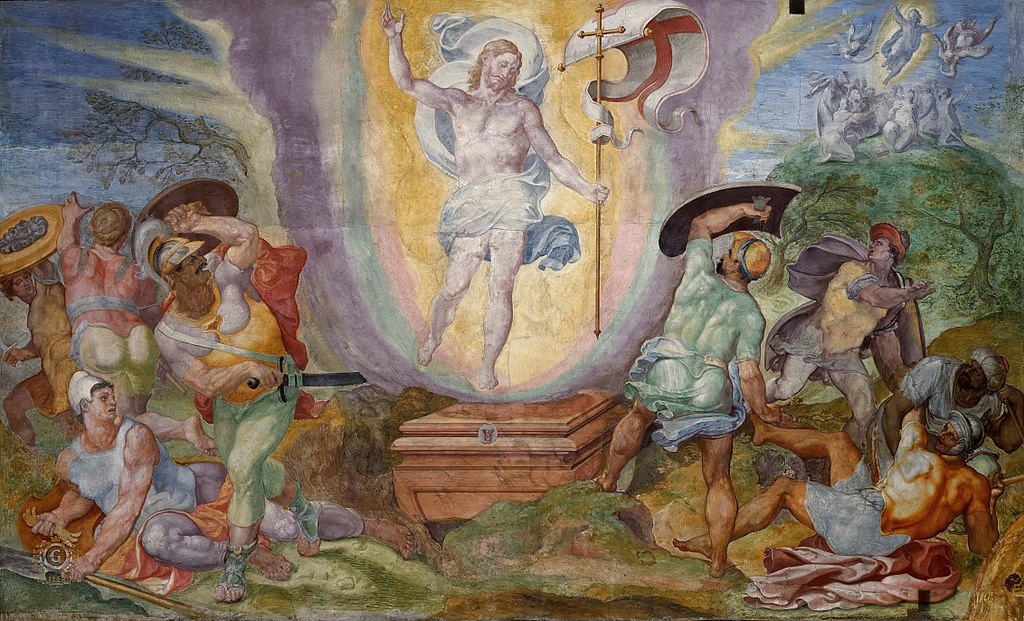We have a real treasury of Catholic prayers which keep our spiritual life anchored and structured: the Lord’s Prayer; the Hail Mary; Acts of Faith, Hope, and Love; and more. But it is also important to pray with Scriptures and engage the imagination. One of the best ways to do that is to put ourselves in the mindset of the characters of the Bible – to see our relationship with Jesus Christ through their eyes, so to speak.
For every Christian, the Resurrection makes all the difference in this life and the life to come. Without it, eternal life and happiness would not be possible. But for each of us, we have to “make it our own” and understand how the Resurrection plays out in our own lives. In that light, this Easter Sunday, I highly recommend a book by a 20th-century British author named Caryll Houselander entitled The Risen Christ: the Forty Days after the Resurrection. It describes the appearances of Jesus Risen from the grave, including the way Our Lord “tailors” those encounters with each of the biblical characters to match their unique spiritual needs. Their experience can help us understand how the Lord wants to transform our lives by His Resurrection.
I’ll paraphrase some of Houselander’s insights and add a few of my own. I hope they help you pray through this Easter Octave and the seven weeks of this glorious Easter season. Our Lord Jesus Christ never forces His love on anyone. Like a seed growing silently in the earth (Mt. 13:31-32), He lets our desire to love Him grow slowly in our hearts, as He nurtures the gift of faith. It is up to each one of us to seek to unite ourselves with Him and to begin to understand that He wants to be closer in Communion to Him and in a deeper love than even the closest of husbands and wives for each other, even closer than a mother to the child within her womb (Is. 49:15).
Consider how Jesus the Risen Lord appears to Mary Magdalene – the first of His disciples except the Blessed Mother to be privileged to recognize Him as risen from the dead (Jn. 20:11-18). She was known to be a public grave sinner. We can imagine how much she would have been held in contempt by others, how much others would not have taken her word seriously and would not have trusted her. She quite likely doubted herself, as we so often do when we recognize our sinfulness and think that we can’t really be loved. But the Lord changes all that. He calls her out by name, tenderly, with no hint of condemnation. And by His love for her, restores her confidence in herself, as He reveals how much He trusts her. So much so that He entrusts her with the most important message the world has ever known. She is the one to tell the skeptical and sorrowing Apostles that they have no reason for despair and every reason for hope, because their Master has risen from the grave. How great a model of penitence at the foot of the Cross, and how encouraging a reminder that – despite our sinfulness – Our Risen Lord entrusts to us His heart and His love, confident that – by His grace – we can return great love to the Lord.
Consider the Disciples on the Road to Emmaus (Lk. 24:13-35). They are the “Bible study” men of the day. They are eager to know the Lord through the Scriptures – but are despondent. They just can’t reconcile the terrible evil and suffering of the one who they thought would save them – nor what seemed like the terrible finality of His death, the defeat it seemed to bring to everything they believed in. They just couldn’t wrap their minds around what happened to Jesus. That all changes when they encounter the Risen Lord on the way. Why? Because in explaining How all Scripture points to Himself, He opens both their minds and hearts to Him. Helps them understand that studying the Bible is not just studying a book, the written word – but coming to know a Person – Who is revealed through that Book. He encounters them personally, in the flesh – above all in the “breaking of the Bread” – that is, in the holy Mass. How great a model for those who find the holy Mass dry or lifeless. Who think of the Bible just as literature. Who are searching to see and know Christ Himself through the Scriptures and the sacraments. Who are waiting to know Christ not just with the mind but all their heart and soul.
Consider Peter, the head of the Apostles, the first Pope: a broken man. We can imagine his inner turmoil, as he plays over and over in his mind the scene where he betrayed the One he loved more than anything in the world – beating himself up over his cowardice, when he not only denied the Lord, but even cursed Him out of fear. Often when we offend those we love most, an act of contrition is necessary – to apologize profusely for the wrong done. But in His mercy, the Risen Lord does not require that of Peter. Instead, when He encounters him, He lets the same impulsiveness that made him deny Christ break out into a spontaneous words of love: “Lord, you know how much I love you!” (Jn. 21:15-19) As is with the case for most men, he expresses His love far more in action than words. So the Lord entrusts Him with the greatest action-love of all – literally to give up his life in preaching Christ’s Resurrection.
